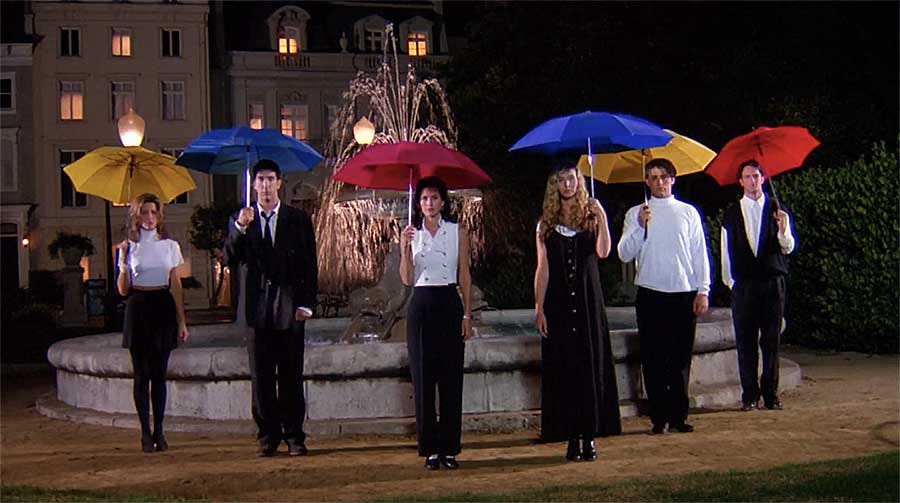The magic of "pajama friends" and why we all could use more of them
Why Friends Is Making Me (And Perhaps You?) So Freaking Nostalgic
I wasn’t a huge Matthew Perry fan, and I wasn’t even a super-fan of Friends. And yet, ever since his death last week, I’ve felt an intense urge to watch old episodes of the show.
Apparently other people have been craving Friends, too, and it’s made me wonder: where is this coming from? And also, when I succumbed to my cravings and started watching it, why did I feel such a sense of nostalgia and longing? What does that say about my —and perhaps your—current life and relationships? What’s gone missing, and what can I/we do about it?
For me, part of my Friends nostalgia is related to my personal background: I grew up in New York City in the 80s and 90s, so every time they show a clip of the apartment building or the Natural History museum or the restaurant where Monica works, I’m reminded of my childhood. (It’s pretty weird to have your hometown be the backdrop of so many shows—Seinfeld is also a nostalgia bomb for me for the same reason.)
Part of my nostalgia is also definitely related to my age: I was a freshman in high school when Friends first aired, so I looked up to the characters—and their bizarrely, inexplicably huge apartment—as examples of what young adult life would be like (which is pretty funny, given the ratio of time they spent working to time they spent lounging on couches).
But the thing that’s making me the most nostalgic, I’ve realized, is the fact that they’re what I call “pajama friends.”1
What are “Pajama friends”?
Pajama friends, by my made-up definition, are friends who feel so at ease with each other that they would be comfortable hanging out in their pajamas (and who see each other so often, and in such familiar contexts, that they sometimes do spend time together in literal pajamas).
I personally had a lot of pajama friends in college, and even after college, when I lived in Brooklyn with a bunch of roommates (and, in a real meta experience, spent a lot of time hanging out with a group of friends who regularly invited people to their apartment . . . to watch Friends).
But now that I’m married and a parent, living in a city where I didn’t grow up, far away from nearly all of my oldest friends? Not so much. (As a freelancer, I do spend a lot of time in pajamas, but unfortunately it’s usually alone.) Most social plans take advance planning and logistics, happen outside of the house, and require me to wear normal pants.
Friends and Their Pajamas
Up till this week, I thought of pajama friends as a metaphor that existed primarily in my own head. But then the other night, while watching the first episode of season one (“The One Where Monica Gets a Roommate”), I noticed this:
Do you see it? Rachel (Jennifer Aniston, for the uninitiated) is serving coffee to Chandler and Joey in her pajamas.
What is striking about this, besides the satin, is that Rachel has just met Chandler and Joey! This is, in fact, her first morning of being Monica’s roommate, and what I believe is her third encounter ever with Monica’s friends. And yet: PAJAMAS.
What comfort! What ease!
I guess one might argue that Rachel’s immediate lack of self-consciousness in her pajamas around these two near strangers from across the hall is a bit odd (though then again, they did just show up unannounced in the apartment at 7am).
But even if it’s a bit premature, Rachel’s comfort is a harbinger of what is to come: both literally and metaphorically, all of the characters become pajama friends. That’s the point of the whole show! Phrased differently (and as explained in the Friends reunion show), Friends was meant to capture the stage of life when your friends are your family, and your family is your friends.
Pajama friends, after all, are people who know you. They’re people with whom you share a library’s worth of inside jokes. They’ve seen you at your worst — and at your best. They’re the people who don’t require coffee dates to “catch up” because—in the ideal pajama friend scenario—you’re such a part of each other’s lives (sometimes to the point of living together) that you already know everything that’s going on with each other. This, in turn, frees you to exist and interact in the present, instead of telling each other about the past.
And indeed, this sense of presence is part of the reason that Friends has remained popular—not just with its original fans, but with new generations of viewers, many of whom weren’t even alive when Friends first aired.
I find this phenomenon fascinating and baffling, so I was excited when I met someone who had actually led a focus group with some of these younger fans and had asked them why they loved the show so much. She said that many of them had told her that the show’s appeal lay in the way the characters hung out with each other: fully and purposelessly present with each other, with no smartphones or laptops.
As she phrased it to me, Friends made them nostalgic for an experience they themselves had never had.
There’s no wi-fi in Central Perk.
Putting aside how depressing that statement was,
my question right now is this: how do adults—like, married adults with jobs and kids and phones, who don’t just happen to regularly stumble upon all of their closest friends hanging out in a coffee shop—achieve the easy intimacy of pajama friends? Is it even possible? Are other cultures better at pajama friends than Americans? And what might our relative lack of pajama friends as adults be doing to our happiness and health?
This is way more than I can write about in one post and also, spoiler alert, I do not know the answer to all of these questions, and it keeps me up at night, and if you have ideas, I would love to hear them in the comments.
But here are some observations and thoughts:
One of the challenges (for me, at least, and perhaps you?) is not necessarily a lack of pajama friends—or even people who could become pajama friends; the problem is a lack of proximity. My oldest friends are scattered across the country, and most of my Philly friends don’t live close enough to make spontaneous hangouts possible. There’s something magical about being just down the hall (or even down the block) from someone.
This physical distance issue is itself a problem because, as social scientists have determined, proximity is one of the three ingredients necessary for close (pajama) friendships. The other two are repeated, unplanned interactions, and spending time together in contexts that encourage people to let down their guard.
Despite all the unrealistic aspects of Friends, it did accurately reflect the fact that for many of us, the stage of life depicted in the show (post highschool/college, before marriage) is the time when these three ingredients are the most likely to be present. (The other stages are childhood and your teen years.) This explains both the plethora of articles out there about how hard it is to make friends after 30, and the fact that many of these articles include screen shots from the show.
Part of the problem is systemic and may not be solvable. Most of us do not live close to our pajama friends (if you do, count yourself lucky!). We’re all incredibly, overwhelmingly busy. And even if we do live close to our friends and have free time, modern parenthood is not structured in a way that supports casual hangouts for adults—I’m constantly frustrated, for example, by the fact that most of my and my friends’ leisure time happens in the hours after our kids go to bed, but we can’t get together in person, because we can’t leave our kids alone in the house. (So we sit on our own couches alone and watch other people hanging out with their friends on television.)
The closest many parents get to casual hanging seems to be standing around as we watch our children do fun stuff—sports games, for example, or birthday parties, or performances. And that’s fine—but those events are really for the kids, not us. And also, it’s hard to feel relaxed enough to wear your metaphorical pajamas at a Little League game or while you’re trying to supervise your child at a trampoline park after they’ve eaten three pieces of birthday cake.I do think that Americans are worse at this than other cultures. Like for a example, a friend of mine recently went to Spain, and sent me the following photo of these groups of adult men—like, separate groups—sitting in some cavernous cafe drinking coffee together and shooting the breeze on a Sunday morning. Not watching sports together, mind you (which is one of the main ways in which American adults seem to casually hang out). Just relaxing in each other’s presence. I’m not saying that other cultures don’t suffer from a lack of pajama friends. But I think they do a better job of valuing adult friendships.
Talk about a man cave.
I think that our relative lack of pajama friends accounts for some of our reliance on our phones and social media: we don’t feel socially or emotionally fulfilled in our everyday lives, so we turn to the internet and social media to try to fill the void. And in an ironic twist, our reliance on our phones often also prevents deeper friendships from developing to begin with—because another requisite for finding and maintaining friends is noticing and paying attention to other people.
This is tragic, because humans need friendship and strong social networks; it’s well known by now that the quality of our relationships has an enormous impact not just on our moods, but on our longevity and physical health. This is why the U.S. Surgeon General has made combating loneliness and isolation one of his top priorities. In other words, pajama friends matter.
What Can We Do About It?
Okay, this is the part I’m struggling with the most, and what I’d like to get your feedback on.
The reality, of course, is that it’s impossible (and probably not even desirable) to stay in the Friends stage of life forever. Life gets more complicated, friends move, and our centers of gravity naturally shift as we find partners, have kids, and proverbially “settle down.” And also: many of these shifts are positive. I am very grateful for my husband and my child, and the relative stability of our lives.
But pajama friendships are definitely a casualty of this transition, and if we don’t want them to slip away, we need to be proactive about it.
I have some suggestions and ideas from my own life, but before sharing them (and before making this post any longer than it already is), I’d like to hear from you. Is this something any of you struggle with as well? Have you figured anything out? Do you have ideas or suggestions? Am I going to have to wait till I’m in a retirement home to be surrounded by pajama friends again?
I would like to be surrounded by people who would be willing to do a photo shoot with me in a public fountain.
To scrolling less, living more, and figuring it all out,
Catherine
More pajamas:
My personal definition of “pajama friends” is not to be confused with the Korean reality show of the same name, which apparently follows four women who work in different professions meeting up “to enjoy 2-day-and-1-night vacations in hotels of various styles within Korea.” Those are different pajamas.











I've been toying with this idea, actually, of "friend" business cards, but I don't know if it would really work/make sense! Sometimes on the playground, for example, I'll meet someone but I don't want to pressure them to share their info w/me or committing to being buds now. I also don't need to give them a business card. But maybe you just hand them your Friend Card, and it has whatever mode of communication on it that you want to share -- maybe just your social media handles, idk -- and if the person wants to reach out, it tells them it's cool to do so. I don't know... but something better than Facebook is needed to get us together IRL.
I love this - I'm in the same boat, with lots of good friends...who are scattered around the country. I'm also a single parent to a 5 yr old. So to your question, What can we do about it? I need childcare (preferably free or low-cost!). I can't do anything w/o my son, so my adult communication is limited to school playground chit chat. If I could actually make plans to go to a coffee shop where my child was supervised w/others in another room, for instance, that would be amazing! With minimum wage at $14/hr, my rare nights out with my sister and her buds are $$, but maybe places could even explicitly offer adult meet-and-hangs, where you just chill out and they watch your kids play?